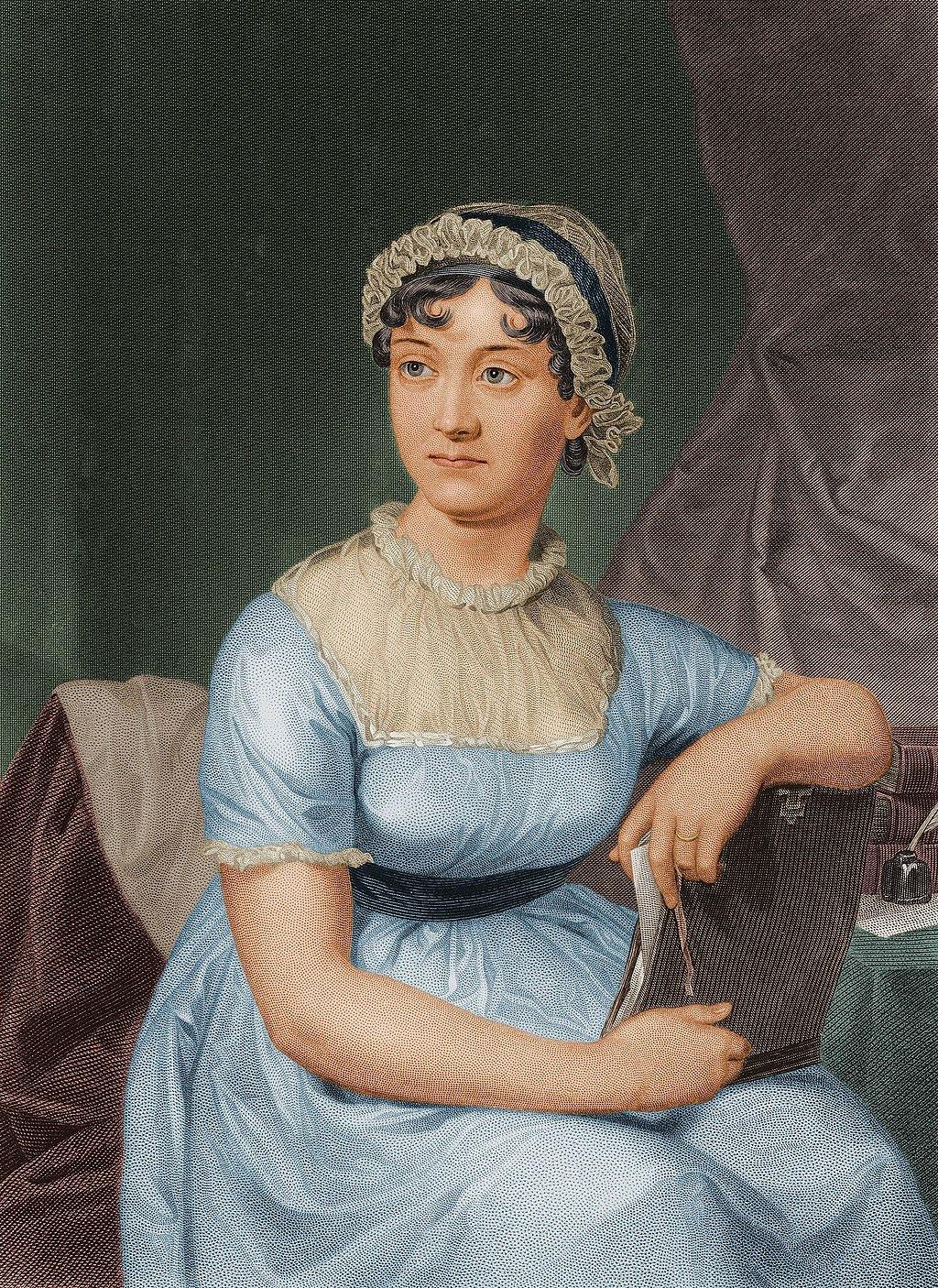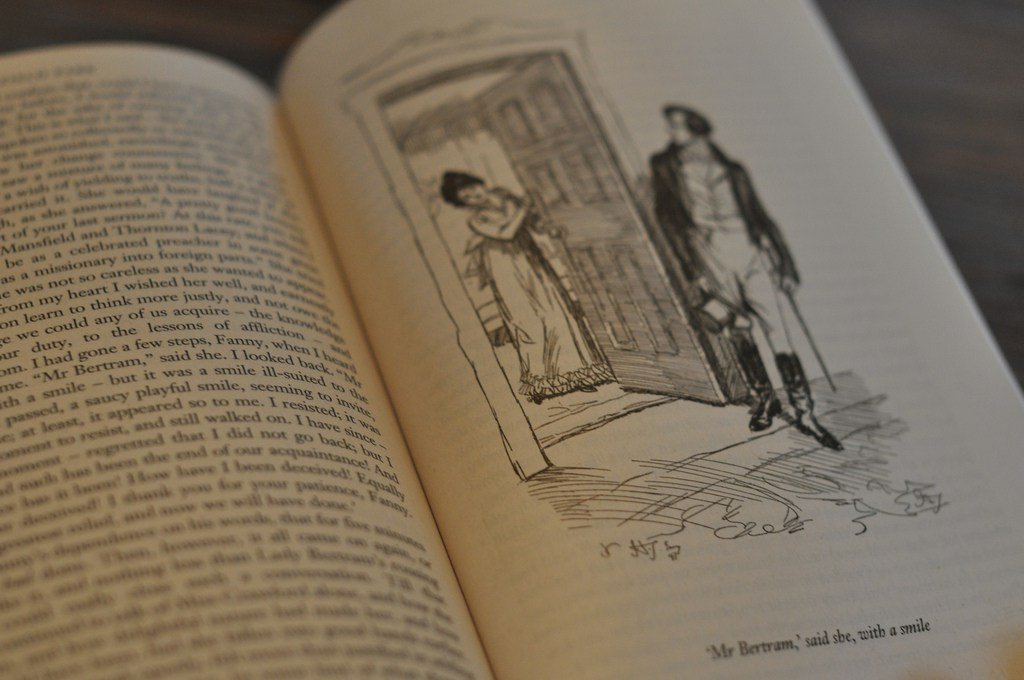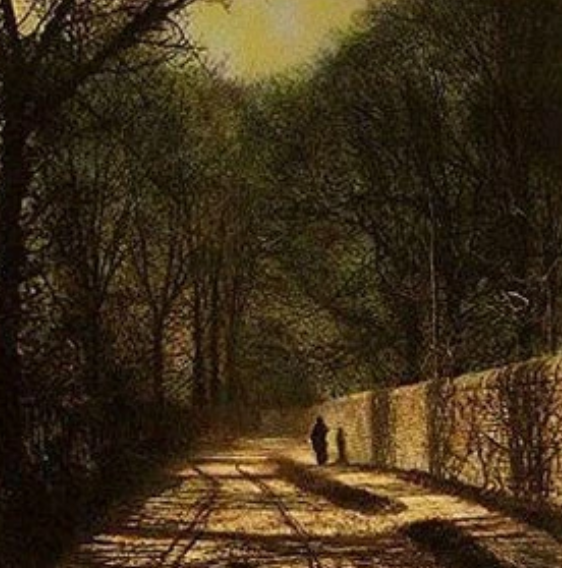
Jane Austen's Caustic Wit
I dearly love a laugh...but...I hope I never ridicule what is wise or good. Follies and nonsense, whims and inconsistencies do divert me, I own, and I laugh at them whenever I can. --But these, I suppose, are precisely what you are without.Elizabeth Bennet
Pride and Prejudice
 There are times when I think Jane Austen and her character Lizzie Bennet (Pride and Prejudice) are more similar than one might at first think. In letters to her sister Cassandra, Jane reveals instances of caustic wit in observations and remarks (aimed at provoking a few gleeful snickers) which are reminiscent of Miss Bennet, and almost downright nasty. Jane was not only a family wit, however, but subscribed to be the "family wit"--the justification behind the tongue-in-cheek observations that we all so love in Austen's work. This justification, I believe, found its expression in Mr. Bennet and Lizzie--but I get ahead of myself. It is not surprising that Jane disliked some of her acquaintance-- don't we all?
There are times when I think Jane Austen and her character Lizzie Bennet (Pride and Prejudice) are more similar than one might at first think. In letters to her sister Cassandra, Jane reveals instances of caustic wit in observations and remarks (aimed at provoking a few gleeful snickers) which are reminiscent of Miss Bennet, and almost downright nasty. Jane was not only a family wit, however, but subscribed to be the "family wit"--the justification behind the tongue-in-cheek observations that we all so love in Austen's work. This justification, I believe, found its expression in Mr. Bennet and Lizzie--but I get ahead of myself. It is not surprising that Jane disliked some of her acquaintance-- don't we all?
But the degree to which she is unsympathetic makes us wonder if it was just to garner a laugh, or if her antipathies ran even deeper-a surprising conjecture for one who showed such great depth of understanding of human frailty in her novels. Let me share a few of the little pokes she took at others, which, mean in nature or not, do make one laugh. Jane, ever the wit, is fabulously expressive.
Lizzie Bond is just apprenticed to Miss Small, so we may hope to see her able to spoil gowns in a few years.
I believe I never told you that Mrs. Coulthard and Anne, late of Manydown, are both dead, and both died in childbed. We have not regaled Mary with this news.[Mary was Jane's sister-in-law, who was expecting at the time. Not to tell her was a kindness, but the way she words it here is definitely a "poke."] Note that she doesn't say, "sad news", or "poor Mrs. Coulthard and Anne." This is the real Jane, speaking unguardedly to her sister and making no effort to "sound nice" for anyone else. She would probably have told the news quite differently to other ears. But this is the point: that within Jane's family, one was quite expected to be a bit, well, cynical. Would the word, 'jaded' be going too far? Perhaps. Jane wanted to amuse her sister in her letters, and no doubt Cassandra is shaking her head with us, a knowing smile on her lips as she reads, but there is a very real streak of unrepentant glee in Austen's treatment of some people. Here's another snippet:
Charles Powlett gave a dance on Thursday, to the great disturbance of all his neighbours, of course, who, you know, take a most lively interest in the state of his finances, and live in hopes of his being soon ruined.In this case it is Mr. Powlett's neighbors that Jane takes a stab at, but it must be noted that she does so with such sarcasm as to underscore her exaggeration. She is having fun while she writes, and one can only imagine all the little such gems and observations the two sisters shared when together in society, that are not written down. Many of Jane's letters were destroyed after her death by well-meaning relatives, leaving us bereft of perhaps hundreds of juicy quotes that should have both appalled and delighted us. This is an unmitigated shame. But here are more:
I expect a very stupid Ball, there will be nobody worth dancing with, & nobody worth talking to but Catherine; for I believe Mrs. Lefroy will not be there; Lucy is to go...
I do not want people to be very agreeable, as it saves me the trouble of liking them a great deal.
On another occasion Jane is writing some very welcome news regarding the future promotions of her and Cassandra's two brothers who are serving in the Navy: She starts with: "I have got some pleasant news for you which I am eager to communicate,...." and then shares the news. Her next sentence is just so, well--Jane. She says, "There! I may now finish my letter and go and hang myself, for I am sure I can neither write nor do anything which will not appear insipid to you after this." It was important to her to be amusing, informative or entertaining, besides merely keeping in touch with her much-loved sibling.
The Austens were intelligent people, and goodness of character, though expected, was not emphasized to the point where it would discourage such delectably sassy thoughts. To some degree, this was a reflection of the times, as letter writing was considered an art, and wit a virtue. But Jane is not trying to form the perfect letter; she is writing to her sister with whom she was intimate and honest. Intimations of the Austen's familial influence of attitudes are seen in the Bennet family when Lizzie is in her father's study, and Mr. Bennet is vastly amused by a letter which purports that Mr. Darcy is planning to offer for Elizabeth. "Are you not amused?" he asks, expecting his daughter to join in his appreciation of what he believes to be ignorant misinformation. Listen carefully to his next words: "Is that not what we live for?" he asks, completely in earnest. "To laugh at others and in our turn, be laughed at as well?"
Lizzie nods weakly in agreement--she has always agreed with this in the past--but she is not at all in the state of mind to either laugh or be laughed at, anymore. This penchant for garnering a laugh at other's expense is so ingrained that when Mr. Darcy visits Lizzie (after the scandal involving Lydia and Wickham is famous), she guesses that he has come "to triumph over her." No other motivation seems possible to her, when in fact, Mr. Darcy is there to do anything but. Back to our author. At the end of a letter to her sister which she has written on Christmas Day, 1798, Jane says, "You deserve a longer letter than this; but it is my unhappy fate seldom to treat people so well as they deserve.... God bless you!" And yet, Jane, we love you anyway.
*****
Linore Rose Burkard is the author of Before the Season Ends, an Inspirational Regency Romance that readers love. She spent a great deal of time researching the period while writing her book. Coming soon from Harvest House Publishers: a new edition of Before the Season Ends, (Dec. 2008) followed by its sequel, The House in Grosvenor Square.( April, 2009).


1 comment
She certainly had a snarky, bordering on cruel, wit. It always surprises me that she created the pious and humourless Fanny Price – a person who, in real life, she would not have particularly liked, I always think.
Catkin
Leave a comment
This site is protected by reCAPTCHA and the Google Privacy Policy and Terms of Service apply.